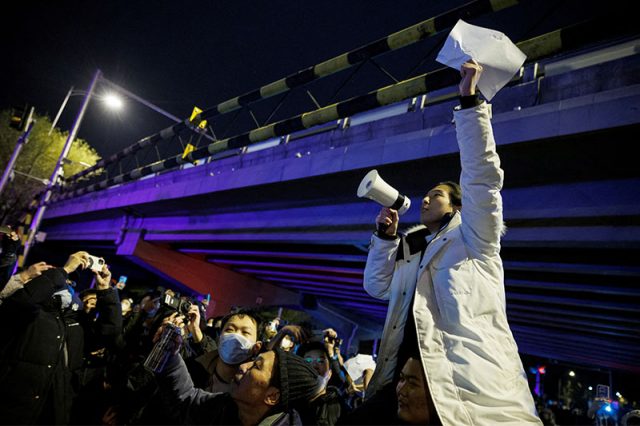
BEIJING — As a large Beijing street protest against strict COVID curbs reached a climax late last Sunday, several protesters shouted the unspeakable — for China’s ruling Communist Party and its leader Xi Jinping to step down.
They were quickly rebuked by some fellow protesters.
“Don’t get people too riled up… we didn’t say anybody should step down,” one lead protester told the crowd through a megaphone.
It was a scene repeated across the country over the weekend, according to social media posts and witness accounts, as protesters fed-up with Xi’s zero-COVID pushed the boundaries by speaking for change in a country where space for dissent has narrowed dramatically under Xi’s increasingly authoritarian rule.
READ: Protests against strict COVID-zero policy are sweeping China. It’s anyone’s guess what happens now | COVID protests escalate in Guangzhou as China lockdown anger boils
Trying to gauge the mood at China’s largest demonstrations since 1989 has been difficult when everyone knows that the authorities and their cameras are watching at all times.
Some people were protesting about a specific grievance, the lockdown of their residential compound, for example; many others more broadly for an end to all COVID restrictions. Some called for more freedoms, like democracy, and at least a few vented anger at Xi and the ruling party.
It is unclear if the easing of COVID restrictions that has accelerated this week will take the fire out of the frustrations that erupted into the most significant public defiance in mainland China since Xi took power in 2012.
One word that cropped up time and again was “ziyou”, according to social media posts and witness accounts, which means freedom and can be interpreted as a demand for release from COVID curbs or a call for political freedom, and thus a challenge to the leadership.
“We want freedom, not COVID tests,” has been a common chant.
ALSO READ: China’s lockdown protests spread to campuses and cities abroad
Many people in the Sunday night crowd in Beijing shouted: “Return freedom to the people, end the lockdowns.”
But that worried some in the crowd, according to a Reuters witness.
“Don’t yell that,” a man shouted. “Don’t say crazy things. We don’t talk about politics. We are good, law-abiding citizens.”
Though to be sure, Xi has championed the zero-COVID policy, so even focused criticism of just the COVID curbs is also criticism of his leadership, analysts say.
“At some level these were eruptions of democracy in the simplest sense, obviously not organized political system of democracy, but just a democratic upswelling of people who wanted to express what they think and what they feel,” said John Delury, professor of Chinese studies at Yonsei University.
‘Bridge man’
Public criticism of Xi or the Communist Party is exceedingly rare.
“The average Chinese person knows it’s extremely dangerous to question the rule of the Communist Party or Xi Jinping by name in any public context,” said Delury.
“There’s a very strict regime of censorship that relies a lot on self-censorship, but the iron hand of repression is there to enforce it,” he said.
Shortly before a Communist Party congress in October, when Xi secured a third term, a man hung banners criticizing Xi and COVID controls from a Beijing bridge before police bundled him away.
His act made headlines and earned him the nickname “Bridge Man”. Some protesters told Reuters they were inspired by his courage and the words on his banners came up in chants.
But many on the streets seemed determined to show authorities they knew the limits of their defiance.
“Even though everyone wanted Xi to step down, the main speaker knew what to say, and told the police that we were all on the same side, and stopped onlookers shouting anything about stepping down,” said Beijing resident Philip Qin, 22, who watched Sunday’s events.
Demonstrators also stressed that no “foreign forces” or “organizations” were behind them and they had turned out spontaneously, according to a Reuters witness.
China blamed pro-democracy protests in Hong Kong in 2019 in part on foreign meddling.
“By declaring that they are spontaneous, they are signalling to the government that they know where the red line is and have not crossed it,” said Diana Fu, associate professor of political science at the University of Toronto.
In Beijing, Qin said he did not want to see things go too far but was also proud of the courage of those who came out and believed it had an impact.
“I hoped the crowd could stay safe and not ask for things that were too out of line,” he said.
“The world will know about us… I think it will have a huge impact on COVID prevention measures to come.”
RELATED: China set to loosen COVID curbs after week of historic protests
— Reporting and Writing by Martin Quin Pollard; Additional reporting by the Beijing Newsroom, James Pomfret and Eduardo Baptista; Editing by Tony Munroe









